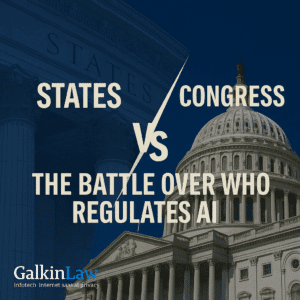
The U.S. House of Representatives is currently considering a 10-year federal moratorium on state-level regulation of artificial intelligence (AI), a proposal embedded within a broader budget reconciliation bill.
This move has sparked significant bipartisan opposition, particularly from state attorneys general who argue that such a ban would undermine consumer protections and hinder the ability of states to address the rapidly evolving challenges posed by AI technologies.
Key Concerns:
Erosion of State Authority:
The proposed moratorium would prevent states from enforcing existing or new AI-related laws for a decade, effectively centralizing regulatory power at the federal level. Critics argue this undermines the principle of federalism and the ability of states to act as “laboratories of democracy” in developing responsive and innovative policy solutions.
Lack of Federal Framework:
Opponents highlight that the moratorium comes without a comprehensive federal regulatory framework to replace state-level protections. This absence raises concerns about a regulatory vacuum where consumers may be left vulnerable to AI-related harms such as privacy violations, algorithmic discrimination, and misinformation.
Bipartisan Opposition:
A coalition of 40 state attorneys general, led by Colorado Attorney General Phil Weiser and including Maryland Attorney General Anthony Brown, has formally urged Congress to reject the moratorium. They emphasize the importance of state-level oversight in safeguarding consumers and addressing the unique challenges posed by AI.
Industry Influence:
The tech industry, including major players like Google, Meta, and OpenAI, has expressed support for a unified federal approach to AI regulation. However, critics argue that the proposed moratorium aligns too closely with industry interests and may prioritize innovation over essential consumer protections.
Implications:
If enacted, the moratorium could significantly reshape the landscape of AI governance in the United States. It would delay state-led regulatory initiatives and potentially slow the development of tailored responses to AI-related issues at the local level. The debate underscores the ongoing tension between fostering technological innovation and ensuring adequate safeguards for consumers and society at large.
As AI continues to integrate into various aspects of daily life, the outcome of this legislative proposal will have far-reaching consequences for how the technology is managed and regulated across the country.
👉 Contact Galkin Law to discuss your AI legal issues.
hashtagAIRegulation hashtagStateVsFederal hashtagTechPolicy hashtagArtificialIntelligence hashtagDataPrivacy
